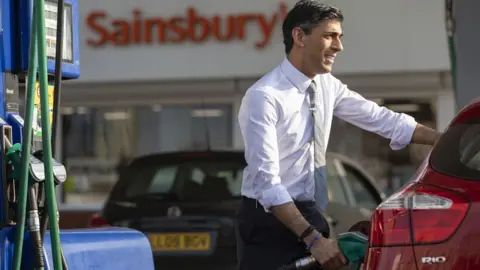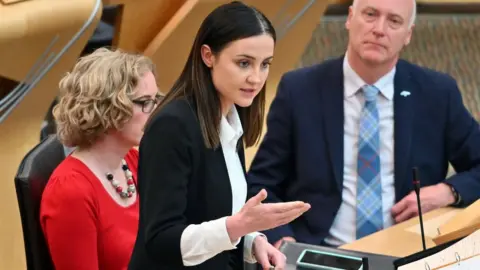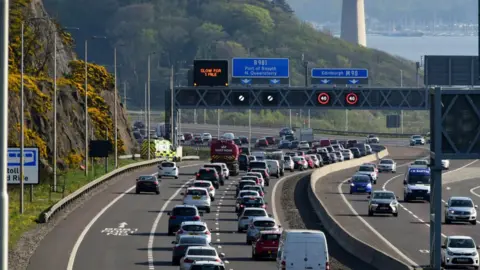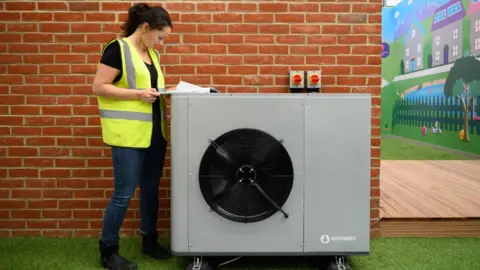How will Rishi Sunak's net zero plan affect Scotland?
 SIMON WALKER HM TREASURY
SIMON WALKER HM TREASURYPrime Minister Rishi Sunak has outlined changes to the UK government's green goals, including delaying a ban on the sale of new diesel and petrol cars.
It sparked anger among climate activists, while Scottish First Minister Humza Yousaf described the decision as "simply unforgiveable".
Scottish government officials are poring over the details of plans in a bid to understand exactly how they could affect Scotland's route to net zero.
What changes did Rishi Sunak announce?
The most headline-grabbing was the change to plans to ban the sale of new diesel and petrol cars in 2030.
Mr Sunak said there would be a five-year delay, meaning people would still be able to buy vehicles which run on fossil fuels until 2035.
It brings the UK into line with the European Union, which made a similar commitment in 2018.
The prime minister also watered down a plan to phase out gas boilers by 2035, creating an exemption for a fifth of households to potentially never make the change to alternatives such as heat pumps.
But he said the UK government remained committed to meeting international climate targets, and to reaching net zero by 2050.
Scottish Office minister Lord Offord said the prime minister's changes would make the transition to net zero more affordable at a time when households were under pressure.
How could this affect Scotland?
 Getty Images
Getty ImagesScotland claims to have more ambitious climate targets than the rest of the UK - it wants to meet net zero by 2045.
But Net Zero Secretary Màiri McAllan told Holyrood the prime minister's announcement "will undoubtedly have serious implications for the delivery of climate ambition here in Scotland".
She said the Scottish government remained committed to tackling climate change and biodiversity loss but "delivery of Scotland's climate ambition is contingent on action by the UK government".
Ms McAllan said Scottish ministers were not consulted on the change of tack by the UK government prior to the announcement at Downing Street on Wednesday.
And officials are studying its detail to understand the ramifications on Scottish policy.
Petrol and diesel vehicles
 Getty Images
Getty ImagesScotland does not have the power to ban sales of petrol and diesel cars but ministers had planned to "phase out the need" for them by 2030, according to its 2020 Climate Change plan.
They believed more people would choose climate-friendly electric vehicles if they were a similar price to traditional cars, and the charging infrastructure was robust.
It seems likely that work on this will continue even though the UK government has pushed the sales ban back to 2035.
But it is clear that anyone who does want a "gas guzzler" after 2030 will still be able to buy one - despite the incentives to go electric.
Heating buildings
 Getty Images
Getty ImagesFrom April 2024, all new homes built in Scotland will have to be built with a zero direct emissions heat supply - heat pumps or a district heating network.
The Scottish government wants to see all homes make the switch by 2045.
Ministers have committed to a consultation on a new Heat in Buildings Bill during the current parliament.
Mr Sunak also announced that a grant for air source heat pumps will increase from £5,000 to £7,500. In Scotland, the grant was already £7,500 for eligible homes.
Are Scotland and the UK on course to meet their climate targets?
The latest available data shows Scotland narrowly missed its target for cutting greenhouse gas emissions in 2021.
Total emissions were 49.9% lower than in 1990 but the target for the year was a 51.1% cut.
It was the eighth time in 12 years that the legally binding target was missed.
Domestic transport was the biggest source of emissions, responsible for 26.2% of the total.
In the UK as a whole, total greenhouse emissions were 48.7% lower in 2022 than they were in 1990.
Domestic transport was also the UK's largest emitting sector, accounting for just under a quarter of emissions in 2022.
The government's independent advisors, the Climate Change Committee (CCC) have called the UK's efforts "worryingly slow".
